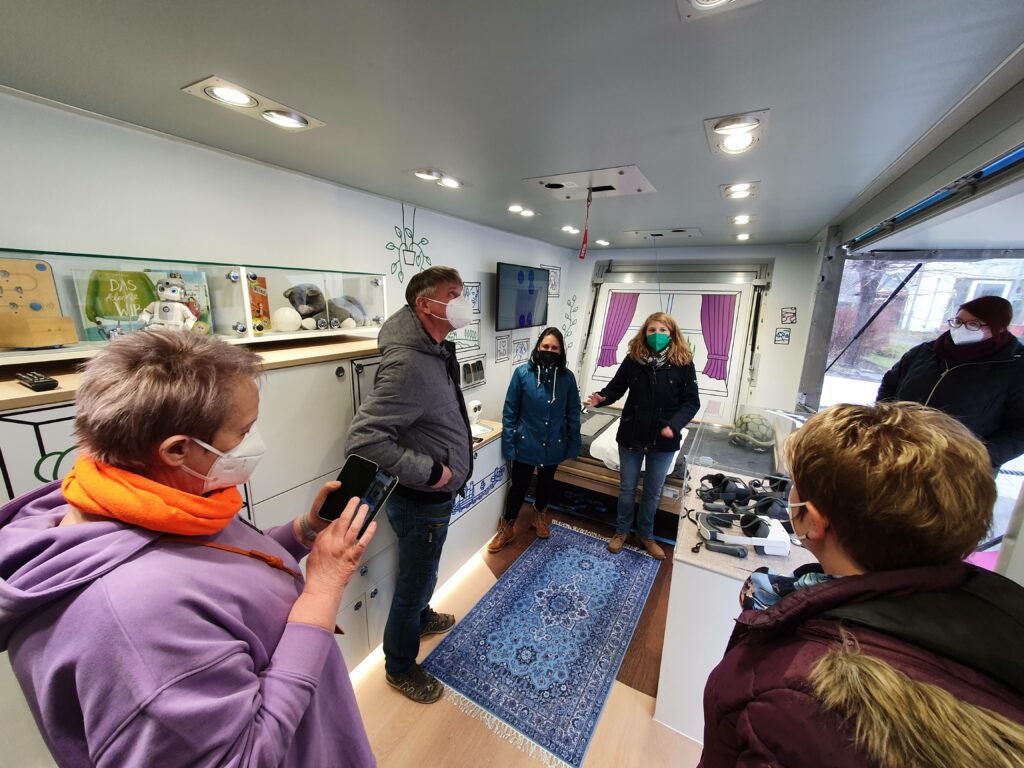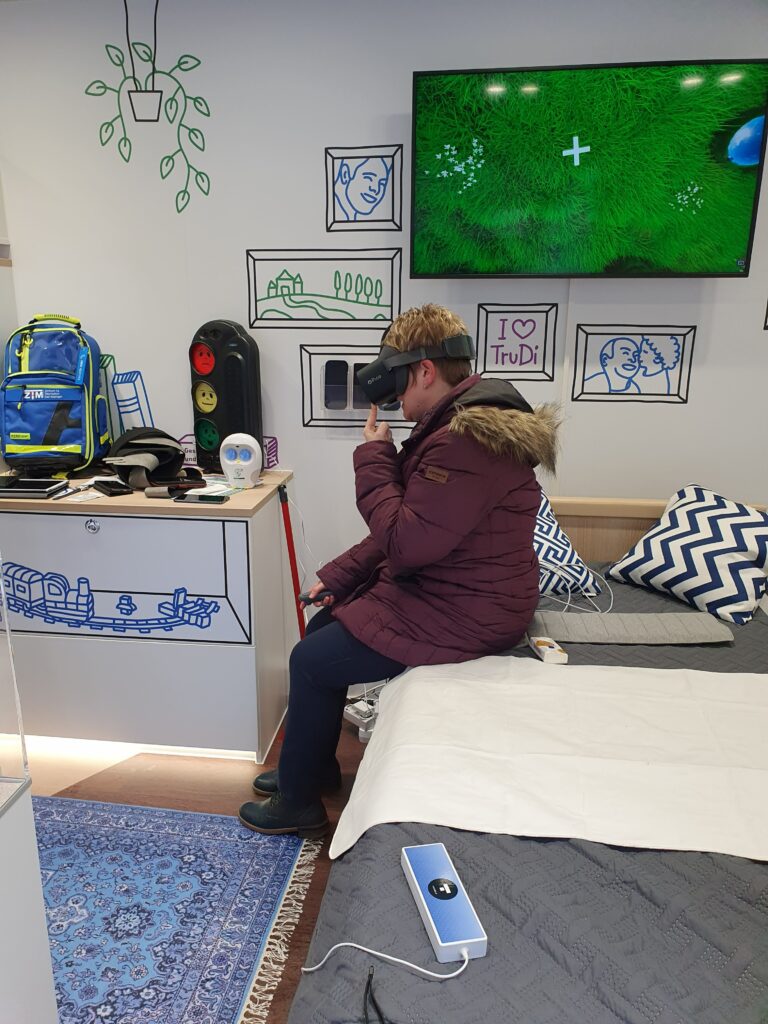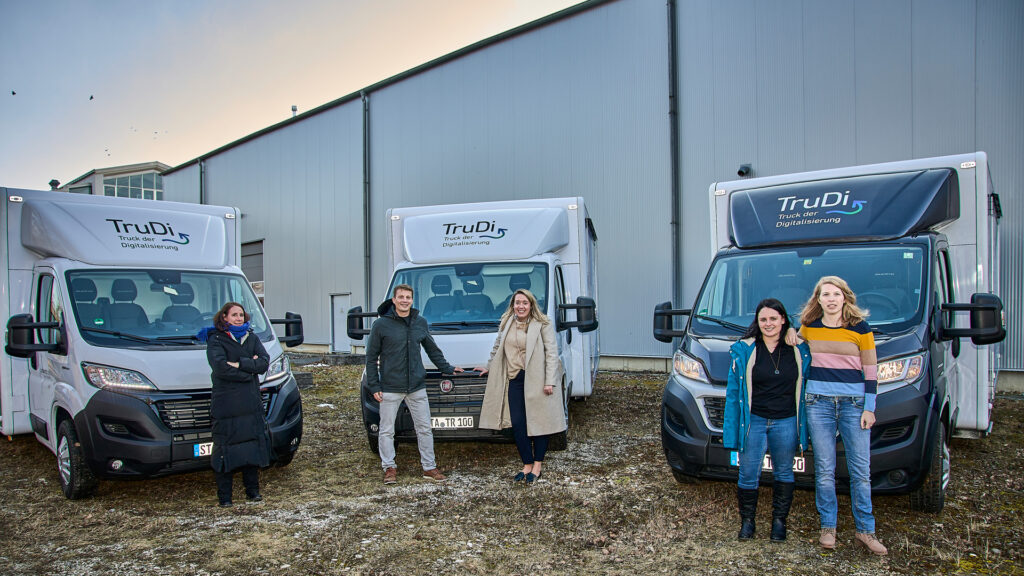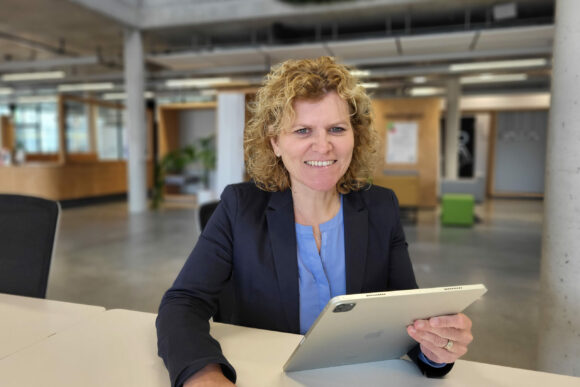With the Truck for Digitization (TruDi), Désirée Neeb and Sophia Giegold visited the Caritas nursing home “St. Elisabeth” in Wallenfels. Both are research assistants in the “Innovative Health Care” research group at the Institute for Information Systems (iisys) at Hof University of Applied Sciences and partners in the “pulsnetz.de – healthy work” project. In their mobile showroom, the TruDi, the two were able to specifically present new technologies and relieving application possibilities for professional practice to the nursing staff. The kick-off event started under the theme “Healthy working with the help of digitalization and AI”.

Ms. Neeb, how did you come up with the idea for the truck for digitalization?
TruDi is part of the already mentioned project “pulsnetz.de – healthy work”, which is funded by the Federal Ministry of Labor and Social Affairs as part of the Future Centers AI program. The target groups are employees and managers in care, daycare centers and social consultancies. The project started in April last year and ends on December 31, 2022. The idea behind TruDi is that facilities, along with their employees, are involved in the process of innovation and digitization as low-threshold and early as possible.
Over the past year, I have therefore been working on the conception and implementation of a mobile showroom. My goal was to create an interactive place to try out and get to know a wide range of technologies. Together with the project team, I always focused on daily work processes and application scenarios in order to be able to offer our target groups solutions that really make sense. The focus of all considerations has always been on people and their health. In other words, not to replace them with technology, but to support them with the help of technology, so that at the end of the day there is more time again for the interpersonal. Among other things, we have exoskeletons, VR and AR glasses, robots, a sensory floor built into the floor, a modern nursing bed, health apps, assistance systems and, for example, duty scheduling software on board.
The fact that we can visit directly on site with the TruDi means that the first hurdle – namely having to travel somewhere (e.g. trade fair, training courses, etc.) – has been overcome. This is precisely because there is little or no time for such trips in the day-to-day lives of nurses and educators, for example.
The Caritas retirement and nursing home “St. Elisabeth” in Wallenfels has already taken advantage of this offer. How was the kick-off event for you?
Sophia Giegold: It was nice to notice how much Désirée and I are a well-coordinated team. You notice that especially when something is changed spontaneously and we both carry on as if we had never done anything else.
Désirée Neeb: The kick-off event was a really great experience! We were welcomed with open arms and that made me very happy – especially for our 1st workshop. We were finally able to put into practice all our thoughts, ideas and concepts that we had been working on over the past few months. I think both the participants and we went through a wonderful learning journey that day. I think the goal of gathering inspiration and new knowledge on the topic of “healthy work” was achieved.
How was TruDi received by the nursing staff? What feedback did you get?
Désirée Neeb: After all, the idea behind TruDi is to be a place of experience for trying out digital and AI-supported technologies. And TruDi has fulfilled exactly this purpose. Our workshop participants used this experimental space for themselves and, with our support, put on lots of technologies, took them in their hands, tested them out, evaluated them and tried them out. If there was some cautious skepticism at the beginning, it had disappeared by the end of the TruDi visit and was replaced by enthusiasm. The following statement reached me after our visit from Eva Maria Müller of the Caritasverband für den Landkreis Kronach e.V.:
I think TruDi and the idea behind it are great. There are solutions and optimization support for all areas of care.”
Eva Maria Müller, Caritasverband für den Landkreis Kronach e.V.
And she continues: “In our case, the focus was on supporting employees in inpatient care, working with dementia patients and nursing staff in the education/training sector. The presented 3D learning program for anatomy or the VR glasses to internalize nursing processes “during dry runs” – in my opinion, these are the possibilities to sharpen competencies in the future, to make learning tangible and also to inspire young people for the profession.”

During your Trudi visits to care facilities, you also always offer additional workshops for employees. What are the contents?
Désirée Neeb: The goal of our workshops is to promote healthy working among employees and managers in the social and healthcare industries. To this end, last year we singled out and evaluated numerous technologies that can serve to relieve, reduce stress, strengthen and promote. We then work with workshop participants to identify where help is most needed, and then try out appropriate technologies together.
In the TruDi workshop, the employees, through the competent guidance of Desiree Neeb and Sophia Giegold, get to know “digital working” live, experience the benefits that digitization can bring, lose their fear of it and develop their own ideas for use and implementation.”
Eva Maria Müller, Caritasverband für den Landkreis Kronach e.V.
It’s clear that the topic of “innovative healthcare” is very close to your heart. Why are you so passionate about it, and what would you like to change with TruDi and your workshops?
Sophia Giegold: I would like to make the world more of a place where people are the focus. Instead of consumption, growth and profit, I want to put health and personal development back in the forefront. Working healthily – as in this project – also means living healthier and more mindfully. I think it just makes sense to use technology to come back to yourself and work towards a more conscious life. So far, we seem to have reached a point where we have become “slaves” to our technology and processes.
Désirée Neeb: I want to help people. Especially nurses and educators, who put their energy and heart and soul into our health and children’s education every day, should be supported and strengthened in their daily work. I would like to help in this regard – to the best of my ability.
Shortage of skilled workers, high fluctuation, strong physical and psychological workload of the employees and simultaneous increase of people in need of care and assistance are the current challenges of the social economy. The pandemic, which has now been going on for about 2 years, has further exacerbated the situation.
But only healthy employees can in turn care for, nurture and support people in need of help. However, the potential of digital technologies and artificial intelligence (AI) is still little used. And that’s something I’d like to change together with the project team and my research team “Innovative Healthcare” at iisys with our truck TruDi (Truck of Digitalization).
Where will the TruDi stop next?
Désirée Neeb: Our first workshop was only a stone’s throw away from Hof, so we will stay close to Hof for the second consultation. As part of the “pulsnetz.de – healthy work” project, we are on the road as a project team in a total of four German states: Sophia and I are touring Bavaria, while our consortium leader, Diakonie Baden, is on the road in BaWü and contec GmbH, also a project partner, is responsible for Berlin and North Rhine-Westphalia. By the way: If you want to invite TruDi as well, you are welcome to do so here: https://www.pulsnetz.de/ki-projekt/trudi/.
Thank you both for the nice interview and good luck with your great project, the TruDi.








